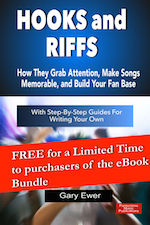There’s interesting research into the phenomenon we call the “earworm” if you take some time to study it. You might find this article, “Why Do Songs Get Stuck in Our Heads” (written by Chau Tu), to be helpful if you’re the kind of songwriter who is looking for ways to write them.
In that article, they use this interesting term: “having an earworm.” The implication is that it’s the listener who “has” the earworm (or not) — a slightly different perspective, differing from saying that it’s the songwriter who’s written one.
They use that phrase “having an earworm” because research has shown that some people are more prone to being “afflicted” by earworms than others. In describing earworms, Chau Tu says this:
In one study, researchers led by Victoria Williamson, a visiting professor at Switzerland’s Lucerne University of Applied Sciences and Arts and a fellow at the University of Sheffield, analyzed more than 50 different musical features and found that earworm songs—tunes that were mentioned by at least three different people in her survey—tend to have notes with longer durations but smaller pitch intervals. This makes sense, she says, because these are two main features that make songs easier to sing, even for the musically untrained. [emphasis mine.- GE]
That much all musicians have known for some time. That’s using the term earworm the way we’d use the word hook. We know that great hooks make use of a short, catchy melody, paired up with an interesting rhythm.
 Gary’s most recent eBook, “Hooks and Riffs: How They Grab Attention, Make Songs Memorable, and Build Your Fan Base“, is now available!
Gary’s most recent eBook, “Hooks and Riffs: How They Grab Attention, Make Songs Memorable, and Build Your Fan Base“, is now available! 
It’s part of “The Essential Secrets of Songwriting 10-eBook Deluxe Bundle”.
But the notion that some are more likely to get snagged by an earworm than others may not be so well known by musicians:
While almost everyone gets earworms at some point, Williamson’s research has found that people with neuroticism and non-clinical levels of obsessive compulsion experience them more often, and for longer periods of time. “These people tend to have more repeated thought processes in general, so it’s perhaps not a huge surprise that these are reflected in their experiences of mental music as well,” she says.
Williamson’s research is pointing out that when it comes to earworms, it takes two to tango. You need to write something that’s easy to sing and rhythmically catchy, but then the rest is up to the listener.
From that standpoint, it might be better to avoid obsessing over writing the perfect earworm, and simply concentrate on ensuring that at least part of your song (typically the chorus) has something short, catchy, and melodically interesting about it, and repeats enough to drill down into the psyche of the listener. In other words, an effective hook.
Pharrell Williams wrote a great hook when he came up with “Happy.” Whether or not it can be described as an earworm is up to the mental processes of each individual listener, the research seems to be saying.
And that suits me just fine, and it should suit any composer of music. Your job is, as it has always been, to write something that can best be described as a complete musical journey. And as with any journey (metaphorical or literal), the best ones have a spot that really grab our attention and make us want to listen.
It’s time well spent to listen to every song you write objectively, and ask yourself: what’s the part of this song that grabs attention? If you can’t answer that one, you have missed an opportunity to create something distinctive and captivating.
It doesn’t need to be an earworm to be successful. But it does need to charm your audience on some level. So my advice would be to stop obsessing over the issue of whether or not your song is an earworm, as that is going to require the reaction of each particular listener.
Writing an effective hook is something you do have control over. And most songs will benefit from moments that use a short, melodic idea, paired up with a catchy rhythm.
Written by Gary Ewer. Follow Gary on Twitter
 “The Essential Secrets of Songwriting” Deluxe ebook bundle is 10 eBooks that will get you writing the kind of songs you always knew you could write. Right now, get a special deal.
“The Essential Secrets of Songwriting” Deluxe ebook bundle is 10 eBooks that will get you writing the kind of songs you always knew you could write. Right now, get a special deal.
Perfect for desktop, laptop, iPad, or any other PDF-reading device. Read more.










